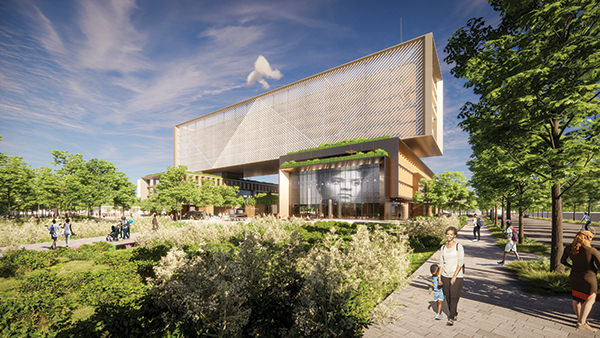The diversity of Illinois reflects the overall demographics of the United States. But the light coming off this forward-looking populace is more like a beacon than a mirror.
You can catch a piece of that light glinting along the shore of Lake Michigan, where the beginnings of a dream are emerging from the remnants of the past.
Summer 2021 saw the Chicago City Council approve a project many years in the making: the $3.8 billion, multi-phased redevelopment of the former Michael Reese Hospital site on the South Side into the Bronzeville Lakefront. The plan calls for 8.2 million sq. ft. of commercial, institutional and mixed-income housing (including a 20% affordable housing commitment) and 4,000 permanent and temporary jobs. It was conceived and carried forward by a team of Chicago developers called GRIT, a 50%-minority organization comprising Farpoint Development, Loop Capital Management, McLaurin Development Partners, Draper & Kramer, Bronzeville Community Development Partnership and CNI.
The plan includes mixed-income housing, a new Metra station, parkland, senior housing, and a medical research and innovation hub that’s anchored by the Israel-based Sheba Medical Center. The infusion of industry, retail and housing the development will bring to the neighborhood, GRIT stated, is expected to generate $3.5 billion in direct economic impact and create 31,000 full-time positions and 45,000 direct and indirect construction jobs. “Indirect economic impact will total $4.7 billion, and tax revenues are anticipated to top $1.5 billion over the next 20 years,” the team said.
‘Everything With Intention’
Equity and inclusion are at the heart of the enterprise. Just ask Farpoint Development Director of Development and External Affairs Morgan Malone. A commissioner for the Cook County Commission on Social Innovation, she was also a 2020 Crain’s Business Chicago 20 in their 20s recipient. Her unfolding career across corporate, social justice, economic development and anti-racism work is about one thing: impact.
“This is going to be generational and transformational,” she says, “the opportunity of a lifetime.”
With pockets of the United States still trying to access the basics, she says, this project will help answer the question “What does health equity look like in America?” Crucial to the answer is public-private partnership, including the important participation of Israel-based Sheba Medical Center as one of the first buildings, the 500,000-sq.-ft. Chicago Accelerate, Redesign and Collaborate Innovation Center (Chicago ARC Innovation Center) rises out of the ground. A 2020 release noted that the center will “develop life-science capabilities for telemedicine, precision medicine and digital innovations around big data, artificial intelligence, virtual reality, rehabilitation and surgical innovation.”
Equity and diversity apply to contracts and vendors, as well as apprenticeship and internship opportunities. “It’s not just for construction,” she says, pointing to the leadership role of Dawveed Scully, senior urban designer with architectural firm Skidmore, Owings & Merrill (SOM), who started as an intern, and has been working with the Michael Reese Hospital project for a decade. He also serves on the board of the nonprofit Bronzeville Urban Development, and has served as a design studio instructor at the Illinois Institute of Technology. “He’s a perfect example of what Bronzeville Lakefront can be,” Malone says, “if we can just replicate that with thousands of Dawveeds.”
Workforce development for the project is still in early stages, with partners ranging from high schools and community colleges to all the major universities and World Business Chicago. A workforce interest form has been launched, and the project team has purchased SkillSmart in order to match individuals with job opportunities based on their resumes and their life experience. GRIT has worked for months with the Illinois Department of Commerce & Economic Opportunity (DCEO), and is just beginning to work with the Illinois Office of Minority Economic Empowerment (OMEE), which will be the project’s workforce development and community engagement partner.

